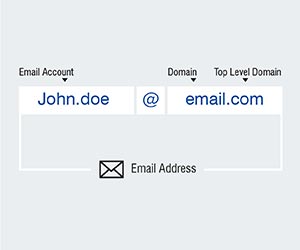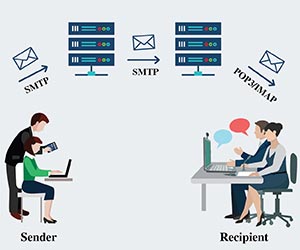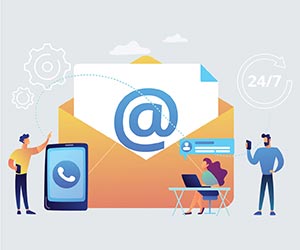How Human Data Annotations Shape Generative AI
Invalid email addresses prevent your sales and marketing communications from reaching targeted inboxes. They damage your sender reputation by flagging your domain and email messages as spam. Robust email validation increases email open rate and decreases spam complaints and unsubscribes.
Email marketing isn’t going away anywhere soon. In fact, it’s growing. In 2022 alone, 333.2 billion emails are expected to be sent daily. The count is set to grow to over 375 billion by 2025. 74% of marketers think that emails are still one of the marketing channels with the highest ROI. They are positive about using email marketing for the coming 5-10 years.
Email validation is the key to the success of your sales and marketing efforts. If you don’t validate frequently, you are accelerating the decay of your email lists. B2B email lists decay at 22.5% per year on an average. It means that your well-crafted sales and marketing pitch will not reach the inbox of your prospective client. Each undelivered email hurts your revenues and dents your sender reputation.
Validation and verification of email lists safeguards your B2B email campaigns from the effects of mailing list decay. Email address validation and verification optimizes ROI of your email lists, ensuring that every mail is sent to the correct address. Email validation also ensures that typos are fixed, and bad email addresses are removed or rectified in real time before they enter your database.
Table of Contents
Fewer emails reaching your recipient’s inbox are one of the biggest hurdles to the success of your marketing campaigns.
Also, with increased use of email marketing tools, the challenges have increased manifold. Email marketing tools segment emails into soft and hard bounces. Such tools directly block customer campaigns that reach certain volumes of hard bounces. For some tools, a mere 3% of invalid email IDs are sufficient for a delivery interruption. Whereas, some tools automatically block the client’s account by simply importing a B2B database with bounces. It damages your email marketing and sinks the ROI of your campaign.
Successful email validation reduces bounce rate up to 98% and helps you to maintain a high sender score. By not sending mails to invalid users, you’ll save money, thus increasing your revenue. You’ll have a higher conversion rate, as you will be able to send your emails to the right email addresses.
Let’s find out why your email lists decay so rapidly and need validation at scale.
People change jobs – Unlike previous generations, people nowadays don’t stay in the same job forever. With a change in their jobs, their email addresses change too. This makes the old email ID invalid and undeliverable. If anything, expect huge numbers of “undeliverable” every few months.
Due to Corona pandemic, roughly 9.6 million U.S. workers (ages 16 to 64) lost their jobs in the first three quarters of 2019 and 2020. Obviously, their email IDs would have gone obsolete and it would be a challenge for you to reach out to them.
Email accounts are abandoned – People often change their email IDs for a trendier or more convenient one. A classic example is of people shifting from Yahoo to Gmail. Or, at times, people set up an email address for a specific purpose and now no longer use it.
From a list of 50,000 email IDs in your B2B database, even if just 5% are abandoned, it gives a false picture of the health of your email list. While emails to these accounts may not bounce due to the status of the account, the point here is that your message isn’t read.
Contact’s email provider shut business or down – When an email provider like EarthLink goes out of business or their server is permanently down, all email domains under that provider become “dead.” The emails associated with this defunct domain also become invalid.
Invalid form entries – With the increased use of mobile to access internet and websites, typos and fat fingers have also increased. Every time a customer/visitor makes a typo on your submission form, they enter an invalid email address. This small mistake paves the path for high bounce rates on your next email campaign.
Manual checks for valid, invalid and unknown addresses at the time of entry can help you avoid the bad ones. But in-house manual validation can lead to high costs to achieve scale.
Don’t end up losing your prospects and loyal clients to dirty email addresses.
Validating emails in your B2B database ensures that both the domain name and remaining portion of any email address are valid and entered/spelled accurately. This validation improves the accuracy of your email list and its worth.
Leading aggregators leveraging B2B data solutions are well aware that email validation is important but are unsure of how to go about it. Based on our experience of working with varied industries and domains; here we bring to you three email validation methods to consider when strategizing how to update your list and boost the return on your time and investment:

This is one of the simplest and easiest ways to conduct email validation. It involves a basic check to find out if the email address is valid and it returns an error when one of three main components is missing:
However, there is a downside to syntax verification. The email address may be technically accurate, but there is no way to ensure that it’s the email address you want. Syntax verification does not guarantee there’s a person behind the email address. What it confirms is that the email address has all the right parts to be valid.

This postal service of the internet is standard for sending email back and forth. It enables you to check with a potential recipient’s email server, if there’s a mail server associated with the domain.
SMTP checks if the syntax is correct or not, and also verifies if there’s an actual user at the other end. All said and done SMTP verification is not foolproof. It is lenient about allowing message delivery, even if it isn’t correct, usually when trying to verify with a catch-all domain (or “accept-all domains).

This is one of the surest and widely used ways for email validation. It guarantees that there is an individual on the other end, and he/she is receiving your emails. However, it requires some efforts.
In this approach, once a web visitor submits an email address in an online form, he or she immediately receives a follow up email to confirm their opt-in. Upon confirmation, that email address is considered verified. Alternatively, an email verifier tool uses the SMTP protocol and pings the email address for a response from the email server. With a valid response, the email address is deemed valid and active.
B2B data aggregators need to remain cautious about invalid entries in email lists. Though sending out large batches of confirmation emails can be costly, low-quality mailing lists can be more costly to marketing efforts. With invalid emails, your client’s money ends up being wasted on unwanted bounces and denting the sender’s mailing reputation.
Boost marketing ROI with validated email listings.
The frequency of conducting email validation varies based on the goals of the email campaigner and business needs. And, that stands true. Addition of 150k profiles every month, and regular validation, update and enrichment of 50 million records in real-time helped a US-based data aggregator build 100% accurate and updated B2B email database. The size of the existing database and business need made regular and automated email validation an imperative.
If you are sending a few emails every month, the bounce rate would be well within limits. Bad or dirty email IDs can be weeded out. However, if the frequency is one email in 4-5 months, it is a big concern. Dirty email Ids would reside and increase in your mailing lists undetected, bringing down your marketing ROI.
Automated bulk email validation with bots and macros helps companies to identify email IDs that hit the threshold of 60 days not emailed or 120 days not emailed. Such records are run through validation tools to ensure they are still active and valid. It might need some additional dollars and resources to implement this. But, it is very useful in evaluating your database and find how records age.
Valid email address lists ensure higher IP and domain reputation of the sender, increase email deliverability, and thus greater chances of marketing success. Automated email validation systems verify addresses for active and dead ends before sending out the mails in a campaign. Email address validation thus ensures expected ROI in marketing efforts.
Cost savings and increased ROI – Every single email sent as part of a marketing campaign costs money. There are many associated costs, especially if you are using advanced third-party email campaign tools. While the costs may seem negligible at low scale, it can increase significantly for bulk campaigns. So, your marketing email that hits a dead-end or non-existent email address directly impacts your bottom line and ROI.
Data insights – Analytical activities for campaigns run on non-validated email lists throw up distorted results. Trends, patterns, and statistics generated are unreliable and inaccurate. On the contrary, marketing analytics based on validated email lists throw up results you can rely on. They provide you with accurate insights to run your next email marketing campaign or create better customer profiles.
Robust validation and verification drive for 28 thousand records gave a leading USA-based specialist advisory firm an accurate and integrated view of customer portfolio to be shared with economic development organizations. The 80+ validated fields across records included email addresses, contact details, company foundation year, employee count, revenue, global headquarters etc.
Improved brand credibility – High email bounce rate indicates spam emails and dirty email lists. It leads to a steep drop in the sender’s reputation. Ranking below threshold increases possibilities of you getting “blacklisted” with ISPs. A high bounce rate can also get you banned by email providers, hurting your brand credibility. Emails delivered to inboxes with no errors shows the excellent reputation you hold with email service providers.
Businesses cannot depend on subscribers to keep them updated on changes in their email addresses. Hence, implementing bulk email validation solution is essential for successful email marketing campaigns. Sending mails to invalid email addresses can cause many issues for you, ranging from loss of domain reputation to loss of ROI. Using the help of email validation experts ensures strong sender reputation, reliable email deliverability, and higher engagement with your target audience.
What’s next? Message us a brief description of your project.
Our experts will review and get back to you within one business day with free consultation for successful implementation.
Disclaimer:
HitechDigital Solutions LLP and Hitech BPO will never ask for money or commission to offer jobs or projects. In the event you are contacted by any person with job offer in our companies, please reach out to us at info@hitechbpo.com